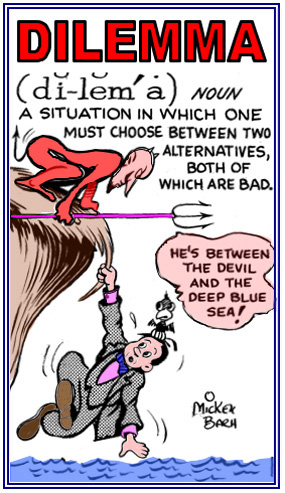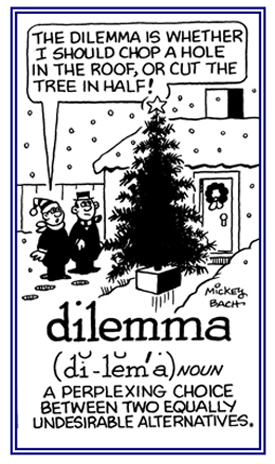di-, dicho-, dich-
(Greek: number two; twice, divided, double; unalike; a number used as a prefix)
digraph
Two successive letters; especially, two letters used to represent a single sound; such as, "sh" in shoe.
digraphy
A group of two letters expressing a simple sound of speech.
digynous
In botany, having two pistils.
dihedral
dihysteria
1. A situation in which someone must choose one of two unsatisfactory options: Because of the bad weather, Lester and his family were in a dilemma as to when they should plan to go on their vacation.
2. In logic, a form of reasoning that, though valid, leads to two undesirable selections: When George was trying to find at least three different definitions for each of the words that he was assigned to find for his English class, his dilemma was that the three dictionaries were giving the same results without any significant variations in contents from one to the other.
3. Etymology: from Late Latin dilemma, which came from Greek dilemma, "double proposition".

© ALL rights are reserved.

© ALL rights are reserved.
Go to this Word A Day Revisited Index
2. In logic, a form of reasoning that, though valid, leads to two undesirable selections: When George was trying to find at least three different definitions for each of the words that he was assigned to find for his English class, his dilemma was that the three dictionaries were giving the same results without any significant variations in contents from one to the other.
3. Etymology: from Late Latin dilemma, which came from Greek dilemma, "double proposition".
This is a technical term in rhetoric, from di-, "two" + lemma, "premise, anything received or taken" from the root of lambanein, "to take".


Go to this Word A Day Revisited Index
so you can see more of Mickey Bach's cartoons.
dimeric
Having two divisions or parts.
dimeter
dimorphic
A reference to the existence among animals of the same species of two distinct forms that differ in one or more characteristics; such as, coloration, size, or shape or the occurrence of two distinct forms of the same parts in one plant, as in the juvenile and adult leaves of ivy.
dimorphism
dimorphobiotic
1. The existence of distinct genetically determined forms of the same species; such as, distinct male and female forms or distinct young and mature forms.
2. Characterized by a regular alternation of parasitic and nonparasitic phases, as in the life cycle of gordian (long slender worms found in water whose larva live as parasites on arthropods) or horsehair worms (nematode worms that live as parasites in the digestive tracts of domestic animals).
2. Characterized by a regular alternation of parasitic and nonparasitic phases, as in the life cycle of gordian (long slender worms found in water whose larva live as parasites on arthropods) or horsehair worms (nematode worms that live as parasites in the digestive tracts of domestic animals).
dimorphous
1. Occurring or existing in two different forms.
2. Pertaining to an organism or substance that exists in two distinct forms.
2. Pertaining to an organism or substance that exists in two distinct forms.
A name consisting of two terms (as the names in zoology or botany, the two terms of which respectively indicate the genus and species).
dioxide
dipetalous
Having two petals.


